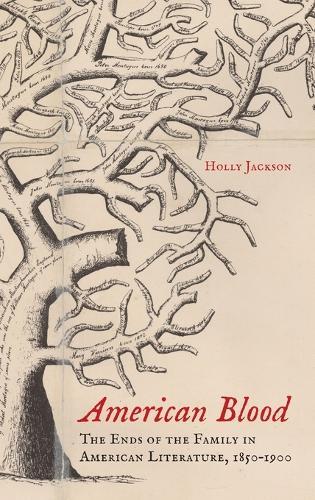Overview
Conventional understandings of the family in nineteenth-century literary studies depict a venerated institution rooted in sentiment, sympathy, and intimacy. American Blood upends this notion, showing how novels of the period frequently emphasize the darker sides of the vaunted domestic unit. Rather than a source of security and warmth, the family emerges as exclusionary, deleterious to civic life, and antagonistic to the political enterprise of the United States. Through inventive readings supported by cultural-historical research, Holly Jackson explores critical depictions of the family in a range of both canonical and forgotten novels. Republican opposition to the generational transmission of property in early America emerges in Nathaniel Hawthorne's The House of the Seven Gables (1851). The ""tragic mulatta"" trope in William Wells Brown's Clotel (1853) is revealed as a metaphor for sterility and national death, linking mid-century theories of hybrid infertility to anxieties concerning the nation's crisis of political continuity. A striking interpretation of Harriet Beecher Stowe's Dred (1856) occupies a subsequent chapter, as Jackson uncovers how the author most associated with the enshrinement of domestic kinship deconstructs both scientific and sentimental conceptions of the family. A focus on feminist views of maternity and the family anchor readings of Anna E. Dickinson's What Answer? (1868) and Sarah Orne Jewett's The Country of the Pointed Firs (1896), while a chapter on Pauline Hopkins's Hagar's Daughter (1901) examines how it engages with socio-scientific discourses of black atavism to expose the family's role not simply as a metaphor for the nation but also as the mechanism for the reproduction of its unequal social relations.Cogently argued, clearly written, and anchored in unconventional readings, American Blood presents a series of lively arguments that will interest literary scholars and historians of the family, as it reveals how nineteenth-century novels imagine-even welcome-the decline of the family and the social order that it supports.
Full Product Details
Author: Holly Jackson (Assistant Professor, Assistant Professor, University of Massachusetts - Boston)
Publisher: Oxford University Press Inc
Imprint: Oxford University Press Inc
Dimensions:
Width: 23.60cm
, Height: 2.50cm
, Length: 16.30cm
Weight: 0.465kg
ISBN: 9780199317042
ISBN 10: 0199317046
Pages: 224
Publication Date: 28 November 2013
Audience:
College/higher education
,
Undergraduate
,
Postgraduate, Research & Scholarly
Format: Hardback
Publisher's Status: Active
Availability: Manufactured on demand

We will order this item for you from a manufactured on demand supplier.
Reviews
American Blood is an important book on nineteenth century debates over race, family structure, reproduction, and the American novel's engagement with these topics. Jackson's attention to detail and her sense of historical context make this a vital work that will be effective not only as a reference, but also as a provocative source for new interpretations of the nineteenth-century family for literary scholars and historians alike. -Shirley Samuels, author of Reading the American Novel, 1780-1865 American Blood is a bold intervention into literary understandings of the family's metaphorical and political roles in the nineteenth century. It convincingly shows how and why a fascinating archive of writers was apostates to the family. Readers in women's studies, American studies, African American studies, as well as literary historians will find this highly readable book to be a meaningful revision of nineteenth-century literary culture. -Jeffory Clymer, author of Family Money: Property, Race, and Literature in the Nineteenth Century [Jackson's] texts constitute--and American Blood contributes to--an understudied but crucial antifamilial tradition in American literature. -- American Literature
American Blood is an important book on nineteenth century debates over race, family structure, reproduction, and the American novel's engagement with these topics. Jackson's attention to detail and her sense of historical context make this a vital work that will be effective not only as a reference, but also as a provocative source for new interpretations of the nineteenth-century family for literary scholars and historians alike. * Shirley Samuels, author of Reading the American Novel, 1780-1865 *
American Blood is an important book on nineteenth century debates over race, family structure, reproduction, and the American novel's engagement with these topics. Jackson's attention to detail and her sense of historical context make this a vital work that will be effective not only as a reference, but also as a provocative source for new interpretations of the nineteenth-century family for literary scholars and historians alike. Shirley Samuels, author of Reading the American Novel, 1780-1865
Author Information
Holly Jackson is Assistant Professor of English at the University of Massachusetts, Boston.




